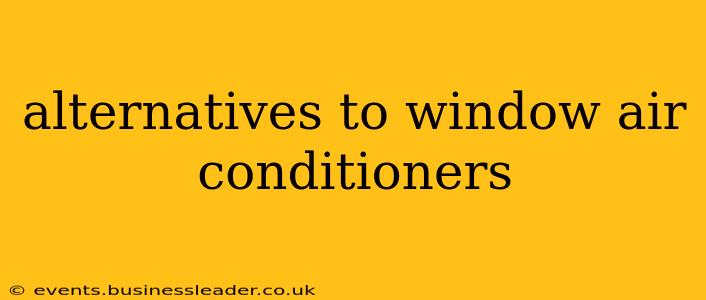Window air conditioners are a classic solution for beating the heat, but they're not the only option, and they certainly aren't always the best option. They can be bulky, unsightly, and inefficient. Luckily, several excellent alternatives provide cool comfort without sacrificing style or energy efficiency. This guide explores the best alternatives, helping you choose the right cooling solution for your needs.
What are the Disadvantages of Window Air Conditioners?
Before diving into the alternatives, it's helpful to understand why people seek them out. Window units can be:
- Inefficient: Older models, in particular, consume significant energy, leading to higher electricity bills.
- Unattractive: They can detract from the aesthetic appeal of your windows, especially in historically significant buildings or homes with carefully chosen window treatments.
- Bulky and difficult to install: Installing and removing them can be a hassle, requiring some physical effort and potentially causing damage to window frames.
- Noisy: Many window units can be quite loud, disrupting sleep or quiet time.
- Limited cooling capacity: Their cooling power is often restricted to a single room.
What are Some Alternatives to Window Air Conditioners?
Fortunately, there are many effective alternatives to traditional window air conditioners. Let's explore some of the most popular:
Portable Air Conditioners
Portable air conditioners offer a convenient and flexible cooling solution. They're easy to move from room to room, and installation is generally straightforward, requiring only a vent hose to exhaust hot air. While typically more expensive than window units upfront, their flexibility often makes them worthwhile.
Pros: Mobility, ease of installation, suitable for renters. Cons: Can be less efficient than other options, require a vent hose, can be noisy.
Ductless Mini-Split Systems
Mini-split systems are a more sophisticated and energy-efficient alternative. They consist of an indoor unit mounted on the wall and an outdoor unit that handles the heat exchange. These systems are highly efficient and offer precise temperature control, but installation requires professional help.
Pros: Extremely energy-efficient, quiet operation, zoned cooling, aesthetically pleasing. Cons: Higher initial cost, professional installation required.
Evaporative Coolers (Swamp Coolers)
Evaporative coolers, also known as swamp coolers, work by evaporating water to cool the air. They're best suited for dry climates, as they're less effective in humid environments. They're generally inexpensive to purchase and operate but require a water source and regular cleaning.
Pros: Energy-efficient, inexpensive to run, environmentally friendly. Cons: Ineffective in humid climates, requires water and maintenance, adds humidity to the air.
Ceiling Fans
Ceiling fans are a simple and affordable way to improve comfort. While they don't directly cool the air, they create a wind chill effect that can make a room feel significantly cooler, reducing reliance on air conditioning.
Pros: Inexpensive, energy-efficient, quiet operation. Cons: Don't actually cool the air, require installation.
Whole-House Air Conditioning Systems
For comprehensive cooling, a whole-house system offers the most consistent and effective solution. While it's a significant investment, it provides consistent, even cooling throughout your entire home, significantly improving comfort.
Pros: Whole-house cooling, consistent temperature, efficient cooling. Cons: High initial cost, requires professional installation.
How Much Do Alternatives to Window Air Conditioners Cost?
The cost of alternatives varies greatly. Portable units are relatively inexpensive, while mini-split systems and whole-house systems require a more substantial investment. Evaporative coolers fall somewhere in between. It’s crucial to consider both upfront costs and long-term running costs when making a decision.
Which Alternative is Best for Me?
The best alternative to a window air conditioner depends on your budget, climate, and personal preferences. Consider these factors:
- Budget: How much are you willing to spend upfront and on ongoing energy costs?
- Climate: Do you live in a dry or humid climate? Evaporative coolers are best for dry climates.
- Space: How much space do you have available for an air conditioning unit? Portable units offer flexibility.
- Installation: Are you comfortable with DIY installation, or will you need professional help?
By carefully considering these factors, you can choose the cooling solution that provides the optimal balance of comfort, efficiency, and cost-effectiveness. Remember to research specific models within each category to find the best fit for your needs and budget.
